Episodes
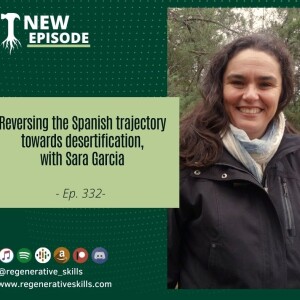
Friday Mar 15, 2024
Friday Mar 15, 2024
In the process of researching the area that I now call home, and working to understand the context and history of the land, I’ve uncovered some fascinating information. The Iberian peninsula made up mostly of Spain with Portugal along the Atlanitc coast and Andorra in the Pyrenees mountains has been dramatically transformed through thousands of years of human history, to say nothing of prehistoric and geological times. Caves and monuments point to some of the earliest evidence of human habitation in Europe. Empires from the Romans through the Visigoths and the Umayyad caliphate as well as various ruling families of the peninsula have all left their mark on the culture and of course, the land. The Spanish empire fueled the colonization of the Americas and the immense sequestration of resources and wealth that followed. This involved unprecedented exchange of biological resources too, that have even become associated with the local cuisine with ingredients like tomatoes and potatoes which are of course originally from south america. The civil war in the 1930s eradicated many rural villages and oppressed non Castilian cultures and resulted in a government structure that still only loosely holds together 17 autonomous communities. Modern industrial agriculture continues to shape the land like never before and it’s all just a superficial explanation of what adds up to the landscape and context that I now find myself building a life in. So you can see why I’ve been on a mission since I arrived to find others to help me better understand the complexities and nuances of the never ending journey of finding my place in this place. This episode is my first attempt at bringing you along with me in this research effort and we have the pleasure to speak to a friend of mine who has built an incredible understanding of the Spanish context through the lens of biology and regenerative landscape design.
Sara Garcia is the founder of Ecoloniza and lead designer at United Designers International. As a forest engineer and permaculture designer, she concentrates on creating ecological design solutions that integrate hydrological cycle management systems, techniques to enhance soil health, and the restoration of native plant communities and ecosystems. Through her experience, she’s learned that project success depends not only on a well-thought-out design but also on effective management, keen observation, and the ability to adapt. As a result, Sara emphasizes the importance of embracing a role as stewards of the land and actively monitoring the progress of the implemented design.I reached out to Sara originally to help me map out and understand the geology and biome of the unique little pocket of the pre-littoral mountains of Catalunya where I live, but I quickly realized I had so much more to learn from her knowledge and experience. In this episode Sara and I will talk in more detail about the history and influences that have shaped the land and life across the Iberian peninsula, both the good and the catastrophic, as well as the trajectory we find it on in modern times.
From there we talk about what is needed to set a new course for ecological prosperity for our region before going into the key awareness and understanding that is needed to act appropriately in any of the immensely diverse bioregions on the peninsula. With that information as a base we also go into the actions and areas of focus that anyone can take to contribute to the regeneration of our incredibly special corner of the earth. Now, some of you might be thinking, well where I live is nothing like Spain, maybe this won’t be interesting or useful to me. My reply to that would be that episodes like this where I take you along on my own journey of research and discovery in an attempt to become an integrated steward of my land and community is meant to act like a case study of the steps that anyone can take to learn more about their own place on this planet and how to actively participate in setting a new trajectory for abundant and resilient life for that space. This is one of many episodes I have planned to give you all a window into what will be a lifelong pursuit of what could be described as my efforts to become a person of place, or re indigenize myself. There are endless ways to approach this vision and so many perspectives to explore, so I’m excited to get this series started with this first conversation with Sara Garcia.
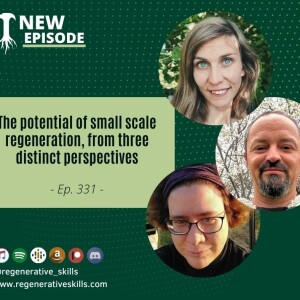
Friday Mar 08, 2024
Friday Mar 08, 2024
I’ve spent a lot of time through the interviews of this podcast speaking with people around the world who are advancing incredible and ambitious projects that aim to regenerate large land bases like farms, estates, or even whole regions. Last week’s conversation with Weruschca Kirkegaard from United Designers is a perfect example of these kinds of projects and the potential of collaborative large scale design.
That being said, it’s such a tiny portion of the population globally that has access or ownership of any land at all, much less many multiple acres or hectares. Despìte that, there are countless examples of inspiring regeneration happening at the small scale as well. In particular the discussion on the Discord community for this show is buzzing with conversations about what members can do and what they’ve achieved on balconies, terraces, strips of land between sidewalks and roads, abandoned lots, small allotments, and little yards. Beyond those who are gardening there are tons of members who are engaged in community work, public service, volunteering and apprenticeships, and other acts of regeneration that have nothing to do with plants or soil.
Since the main purpose of this show is to highlight the abilities that any of us can cultivate, regardless of experience, location or access to resources, I wanted to highlight some of the most active and engaged members of our Discord who exemplify the potential of small initiatives that act as the seeds for transformation which blossom into the catalysts for meaningful change in their neighborhoods and local networks. Today we’ll hear from three people from very different corners of Europe. Kathryn in the UK, Bobby in Bulgaria, and Theresa in Estonia.
Kathryn describes herself as a stubble-jumpin' Saskatchewan girl transplanted to London. When she isn't composing choral music, helping out at church, or cycling around London, she grows plenty of fruit and veg on allotments, in a churchyard and in her back garden. She likes cats and spaghetti and hates punctures.
Bobby was born and raised in a family of generational growers and agrarians. His own family of 5 lives in the western highlands of Bulgaria on a quarter acre plot, extended virtually to all the neighbors' gardens they’ve helped create. A zero input integrated garden is in the heart of their permaculture, degrowth and holistic approach to life. Growing everything from annual and perennial veggies, medicinal herbs, small fruit bushes and larger fruit and nut trees, their main yield is community and resilience via an ever deepening connection to place and people.
Therese is an experienced plant enthusiast who has been involved in gardening since childhood. She’s lived and traveled to various places around the world, creating nature-inspired gardens wherever she’s lived. Therese focuses on using local natural materials and practicing holistic cultivation methods, with an emphasis on growing edible plants and at the moment she’s growing in zone 5, in Estonia.
Their different stories and efforts are a constant source of inspiration in Discord community and I know many of you will find ideas and relatable circumstances from them that larger regeneration projects are unlikely to offer
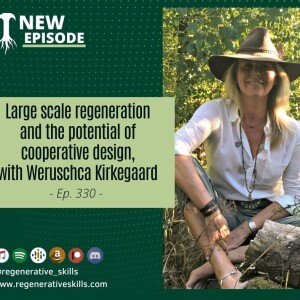
Friday Mar 01, 2024
Friday Mar 01, 2024
Todays episode is going to build on a couple concepts that I’ve been exploring from different perspectives. The first is that of the power of community, and the second is different scales of regeneration. In this episode I’m joined by my good friend and mentor Weruschca Kirkegaard
based in the Netherlands, Weruschca the is co-founder of United Designers International and head of their project management. Her combined experience and knowledge of aesthetics, nutrition, health, and communications brings a multidisciplinary expertise to the design table.
She is seasoned in large scale project management and brings her skills to the larger ecological canvas with site science based regenerative planning and design from Adaptive Food Production, residential and commercial contexts, to Agroforestry and Municipal green space.
The aspect of community that Weruschca and I explore in this episode is focused on the inner workings and collaborations of United Designers International, the regenerative design consortium that she co founded with Dan Halsey. Their organization breaks the mold of most conventional businesses which try to hoard market share, or even freelancers that try to do everything themselves so that they don’t have to divide up the money that is coming in. Instead we explore reasons why bringing in as many people on a project is not only good for the project, but also for the people involved.
United Designers is also world renowned for working on high profile and complex projects. Weruschca sheds light on the challenges of working on large initiatives with massive investments and many multiple stakeholders, and the way she has learned to navigate those complexities and broad considerations. If you’ve ever wondered what the inner workings of a proposal to the UN for regional scale regeneration or the process of ecological design for a massive estate looks like, this is the episode for you.

Friday Feb 23, 2024
Friday Feb 23, 2024
For those of you following along from the last three episodes of this season so far, I’ve been sharing the intimate details of my own journey along with my good friend Nick Steiner as we’ve gone around to visit a number of out client’s projects in the south of Portugal and both gather essential data to inform our process and actually put that process into action implementing water retention features.
We’ve seen examples of farms facing droughts and rural communities facing wildfire and working to recover from it. In last week’s episode with Aline from La Casa Integral, I also explored what severe drought in my local community looks like and explored the actions both ecological and community oriented to set ourselves on a new path.
Though water cycle restoration will always be a theme on this show, today's episode is going to wrap up this personal deep dive for a little while. I believe that regular reflection on one’s learning process is essential to continued progress and today I’m joined by two people that have been major figures in my learning and growth, Nick Steiner of course, and Zach Weiss. Nick is of course the founder of Permanick water solutions and Zach is the founder of Elemental Ecosystems, project implementation company, and Water Stories his online teaching and community platform focused on building water solution awareness and education. Since both of them have appeared on this show quite a number of times I’ll skip over their introductions and instead have linked to previous episodes with them in which we explore their backstories.
We’re having this conversation at an important point for a couple reasons. Nick and I had just submitted out final project report in order to complete the professional certification, the highest tier of completion through the water stories training course, and Zach and the organization have just opened their training once again to new applicants.
Together, the three of us reflect on our different learning journeys to get where we currently are. We discuss in depth both the obvious and less apparent skills that we each believe is essential for effective work in this space and in order to develop ourselves as true regenerative actors.
Each one of us talks about our personal turning points and “aha moments” as well as mentors, growing pains, and areas in which we still need to improve. We cover different roles and responsibilities in the space of water restoration and how designing and installing ecosystem features is only one which we have a common passion for. We also recognize the need for so many other skill sets, experience bases, and focuses that are required to bring regeneration to the scale that is needed.
I also really recommend that you listen to this one all the way till the end when Zach gives us a brutally honest review of our final project submission and critiques our work with no filter.
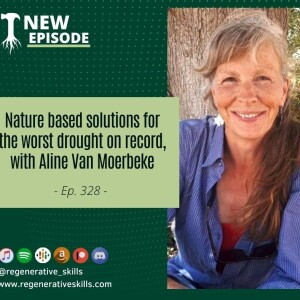
Friday Feb 16, 2024
Friday Feb 16, 2024
I’ve talked a lot about drought and water management on this podcast. It’s becoming a bigger and bigger part of my work and specialization, both in the work I do with private clients and through the network of farmers that I work with through Climate Farmers. At the moment, these topics are hitting home for another reason. Catalunya, the region where I live in Northeastern Spain is currently experiencing the most severe drought in its recorded history, and there is little relief in sight.
Now obviously I’m not from this area of the world myself and though I’ve built a competent understanding of my local context and the water management history of this region, I’m always looking to better understand the scope and options of what is happening in this time of climate emergency.Another big focus of mine lately has been to reach out and make connections to others in the area who are working on nature based and regenerative solutions to the challenges we face in hopes of supporting existing efforts and making myself useful to the people and organizations who’ve been working in this space for a long time. One source of unification around these efforts in my area and consistent messages of inspiration and hope come from the small company La Casa Integral, and today I had the pleasure of speaking to Aline, one of the co-founders of the company.Aline Van Moerbeke is Flemish Belgian by birth but feels most Mallorquina after spending over 20 years in San Roqueta on the island of Mallorca. She now lives with her partner Juan Pedro in the Maresme region just up the coast from Barcelona in Catalunya where they run their business La Casa Integral, a permaculture and ecological design company focused on the needs of the communities of the Balearic Islands and Northeastern Spain. Aline is also the co founder of Permacultura Mediterranea and is highly active in many networks and initiatives in the region.
In this episode, Aline and I begin by talking about the unique journey that she took to begin a career in permaculture education and regenerative design. From there we go into the unique context behind the current drought and how Catalunya is wrestling with this challenge. Since she has made an incredible effort to participate in and lead many discussions at various levels of government, industry, and communities, she gives me an overview of the ideas and solutions that are being proposed and the entrenched ways of thinking that are holding progress back.
Through her work at La Casa Integral she and Juan Pedro have advanced many unique water saving and recycling solutions and we explore some of them and even take a closer look at natural blackwater filtration systems that they are known for designing and installing for many different use cases.
We also talk about reasons for hope in the policy and institutional structures at our local level and explore the first steps that anyone listening can take to gain a better understanding of their own opportunities to participate in the restoration of their own water systems, at any scale. This interview is a first step towards two things that I am trying to do more of in this season. The first is to highlight the incredible work that is being done by so many local people in my area, partly to build closer relationships with them myself, partly to demonstrate that most of the really effective people in this space are not the big name famous people from your documentaries and social media threads, and partly to show what it could look like for some of you listeners to explore your own local scene of regenerative workers and advocates instead of always looking outside your communities for solutions. Many of the topics that I’m passionate about and like to focus on might not be relevant or interesting to you, but the idea of connecting with and exploring the hyper local community of like-minded people doing good work around you is more important than a couple highly effective but isolated actors. Another theme I’ll be promoting this season is that of inspiring examples of collaboration. People who break the mold of protectionist business practices, ivory tower academics, and competitive paradigms of commerce. Aline and La Casa Integral are a perfect example in my area of folks who are leading through collaboration and by including the voices and expertise of as many people as they can. Their creation and participation in countless committees, online groups, advocacy organizations, and volunteer initiatives show a true commitment to the larger vision of realizing change in our region, and I know this chat will inspire you as it did for me, even if the challenges in your region have more to do with too much water rather than too little.
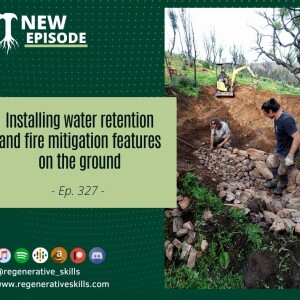
Friday Feb 09, 2024
Friday Feb 09, 2024
Continuing on the journey we started in the last episode, Nick and I went to the next project where we got to install the types of water retention features that we had designed for the previous clients. Together we talk about the joys and the challenges of site where we were creating these earthworks. Over the previous summer the whole landscape had burned in a wildfire and the clients there are especially motivated to mitigate the risks moving into the future. We also got to work with a team with a variety of experiences and talents which contributed to the creativity and the outcome of the project. In just over 3 days of work we were able to build a small infiltration basin in an eroded valley and an infiltration terrace along a fire-prone ridge with many unique features in each. Follow us was we take your through the full process in this episode
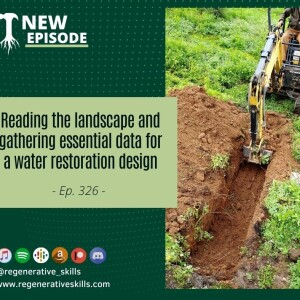
Friday Feb 02, 2024
Friday Feb 02, 2024
Welcome to the first episode of season 8 of the Regenerative Skills podcast. We're starting in a big way with a special episode in which me and my good friend and collaborator Nick Steiner will be taking you along with us on a client visit in the south of Portugal in the very first steps of a water retention landscape project. We'll be giving you a behind the scenes look at what we do on these jobs, the landscape indicators that we're observing to inform our concept plans, and all of the essential data we collect while out in the field as we build the initial design for this farm. Southern Portugal is a classic area to illustrate the patterns of drought, flood and fire that are the result of landscape degradation. This mediterranean climate has been getting dryer and hotter in an accelerated way over the last few decades, and the result is failing farms, abandoned villages, and land that is on a downward trajectory. Each day we'll describe what we're up to out in the field, offer summaries of the discussions with the clients, describe the landscape features and observations we're making and even the heavy machinery work that it takes to inform the placement and types of features that can be implemented in order to turn the trajectory of this farm around through watershed restoration. Don't forget that you can see pictures and videos of our time out in the field on our social media pages and on the Regenerative Skills community on Discord.

Friday Dec 29, 2023
Friday Dec 29, 2023
There are a few farms and organizations here in Spain that have been gaining international attention for their work and initiatives in the past few years. Partly through reaching out directly and partly through the Climate Farmers network I’ve been connecting with them to bring their inspiring stories and innovative knowledge to the farmers community that I help to manage.
One of the most established and accomplished of these farms is La Junquera, an 1100 hectare farm in one of the most environmentally challenging regions of Spain in the south eastern province of Murcia in the altiplano region.Now some of you may remember previous interviews I’ve done with Alfonzo Chico de Guzman, the owner of the farm and one of the driving forces of the Alvelal cooperative that he helped to found, but today I’ll be speaking with his wife and co-owner of the farm to get a deeper look at all the projects that she has helped to lead simultaneously.Yanniek Schoonhoven is also the co-founder of the Regeneration Academy, a physical learning hub and model farm in La Junquera, focused on building a space and community to help students become practitioners, entrepreneurs, innovators and leaders in the field of regenerative agriculture and eco-system restoration, specialized in semi-arid climates.
Yanniek has built a reputation in the regen ag space as an expert connection builder, weaving partnerships from the local community around them in Spain all the way up to the European Union level along with universities and non-profits. All of these connections are fueling the positive change that The Regeneration Academy and the farm itself are having on the ecology as well as the human communities around them.In this session we explore the journey that led Yanniek to southern Spain and the creation of all the projects that she now helps to coordinate. Yanniek talks about the unique challenges that they face in their remote rural area as well as the climate and ecological challenges of rebuilding the capacity for life on the land there.We also dig into the connections that she’s helped to build and strengthen that have brought visibility, support, and recognition to their efforts on the ground while making it possible to include more people in their training and projects.This is also a great opportunity to announce the collaboration that I’ll be doing with them as I’ll be co-facilitating a course in the upcoming year with them about water resource management.
At the end of the episode we give an overview of the curriculum that we’ll be teaching through a highly immersive project of gathering essential data, co creating a design for water retention on a micro watershed on their farm, and actually implementing the design on the site.
We’ll be training participants on a wide range of tools for site design and layout as well as building experience with everything from hand tools to guiding heavy machinery in order to install the design. You can find all the details about the course which will be from April 8th-11th in the show notes for this episode on the website,
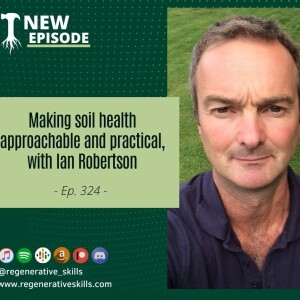
Friday Dec 22, 2023
Friday Dec 22, 2023
By now I’m sure many of you have heard the few episodes on soil health that I’ve recorded with people like Harriet Mela, Matt Powers, James White, and others. I know that the subject of soil has become really popular with growers and it’s always talked about as being central to the success of regenerative agriculture and broader environmental health, and I don’t disagree. Yet I’m often worried that the discourse around soil science is reminiscent of other scientific studies in which there’s a never ending search for more granular details.
Breaking components of the whole overview down into chemistry, biology, and even down to anatomical structure, all without making the learnings accessible to soil stewards, growers and land managers.
Such detailed science shrouded in a veil of technical jargon and research papers makes me feel that the real learnings are inaccessible and overly complicated. For that reason I’ve often held back from really going deeper into soil on this show.
Here I hope to find the key concepts and actionable information that anyone can use to get real results, and that’s often been hard to find.
Yet that’s exactly what brings me to today's session, where I get to speak to a soil scientist and consultant who believes, as I do, that we need to make soil concepts and principles more accessible and help to guide land managers along the way to learn how to make their own observations and discoveries in order to foster relationships or understanding with the land we take care of.
Ian Robertson has a lifelong involvement in all things soil, growing up on an organic farm, and working in various roles helping farmers understand their soils. His present role is General Manager of Sustainable soil Management, a soil testing and consultation company in the UK.
Over the last 20 years Ian has developed the most detailed soil test, which is widely used throughout the UK and Europe, allowing farmers a greater understanding of how best to manage their soil. Ian delivers soil presentations that are practical and engaging and he works across all sectors of agriculture to build long term relationships between himself, farmers, and their soil.
In this episode we start by exploring what aspects of soil are really essential to understand a holistic picture of the function of the earth you’re working with, as well as the best tests to gain that knowledge. Spoiler alert, many of those tests turn out to be things you can observe with your own senses. From there we dissect the three main conventional agricultural practices of tillage, fertilization, and crop protection chemicals such as herbicides and pesticides for their impact on the soil and what is really happening from a scientific perspective when they are used.
We use that part of the discussion as a springboard towards which soil stewardship practices are broadly beneficial and represent the least amount of risk regardless of the soil type and makeup you have.
Ian’s learnings from decades and thousands of soil tests make for a very practical and digestible overview of the more detailed science out there and hopefully will act as an antidote to the overwhelming amount of information about soil out there at the moment.
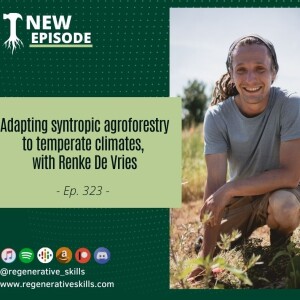
Friday Dec 15, 2023
Friday Dec 15, 2023
Syntropic Agroforestry has exploded in popularity and interest in the last few years. I’ve explored this agroforestry design and management system a little in some previous episodes with my friend Jacob Evans, but there’s so much more to explore.
First pioneered by renowned farmer Ernst Gostch in Brazil, his integrated approach of dense planting and timed pruning and intervention to accelerate natural succession and replace outside inputs for both ecosystem regeneration and nutrient dense food production has sparked an interest in many people to adapt the concepts to their own climates and contexts.
From what I’ve heard however, adapting syntropic methods to temperate climates has proven more difficult than many people originally thought. The plants that thrive in these latitudes have different growth cycles with their long dormant period and many compete for light more than their tropical counterparts. Luckily I was able to find someone who has not only studied with Ernst closely in Brazil, but has also been pioneering syntropic systems in Germany who was able to share some key learnings from the first couple years of trial. Renke de Vries studied International Forest Ecosystem Management, and works as an agroforestry designer and consultant and in arboreal maintenance. From 2019 till 2023 he has been responsible for the design, establishment and management of syntropic agroforestry systems especially at Gut and Bosel, the famous farm in Brandenburg outside of Berlin in Germany. In this interview we go into the learnings that he brought from his formal studies in forestry and forest management and how they juxtapose with his learnings from Ernst in Brazil.
We also dig into the systems that he has been designing and planting and the crucial learnings in his ongoing attempts to use syntropic principles in temperate climates. Though there is still so much to learn and experiment with, I’ve been very interested to see the different iterations of what I’m convinced are very wise and widely applicable principles of ecological management from the syntropic concept. Hopefully this discussion will spark some interest in some of you to start your own agroforestry experiments.









